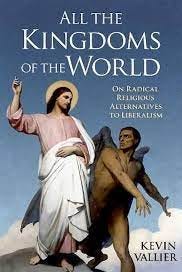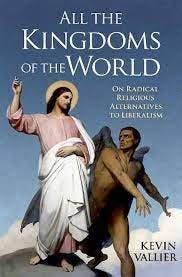There is a species of Catholic political thought known as ‘Integralism’, which postulates the ideal state as one that is guided by Catholic principles and that the Church should have a direct role in the governance of society.
Catholic Integralism is premised on recovering the integration of Church and State that disappeared after the decline of Christendom and the rise of nation-states in the eighteenth and nineteenth centuries. There is a tension in Catholic thought, exemplified by the differences between the Vatican II document Dignitas Humanae (1965) which affirms religious freedom, and the way Popes of the late nineteenth and early twentieth centuries had conceived of ‘Christ as King’ even over civil affairs, such as in Pope Pius XI’s encyclical Quas Primas (1925). In fact, QP argues:
Men must look for the peace of Christ in the Kingdom of Christ; and that We promised to do as far as lay in Our power. In the Kingdom of Christ, that is, it seemed to Us that peace could not be more effectually restored nor fixed upon a firmer basis than through the restoration of the Empire of Our Lord [1]. … This kingdom is spiritual and is concerned with spiritual things [15]. … [But] It would be a grave error, on the other hand, to say that Christ has no authority whatever in civil affairs, since, by virtue of the absolute empire over all creatures committed to him by the Father, all things are in his power [17].
But note these words too!
Thus the empire of our Redeemer embraces all men. To use the words of Our immortal predecessor, Pope Leo XIII: "His empire includes not only Catholic nations, not only baptized persons who, though of right belonging to the Church, have been led astray by error, or have been cut off from her by schism, but also all those who are outside the Christian faith; so that truly the whole of mankind is subject to the power of Jesus Christ."Nor is there any difference in this matter between the individual and the family or the State; for all men, whether collectively or individually, are under the dominion of Christ. In him is the salvation of the individual, in him is the salvation of society. … If, therefore, the rulers of nations wish to preserve their authority, to promote and increase the prosperity of their countries, they will not neglect the public duty of reverence and obedience to the rule of Christ. What We said at the beginning of Our Pontificate concerning the decline of public authority, and the lack of respect for the same, is equally true at the present day. "With God and Jesus Christ," we said, "excluded from political life, with authority derived not from God but from man, the very basis of that authority has been taken away, because the chief reason of the distinction between ruler and subject has been eliminated. The result is that human society is tottering to its fall, because it has no longer a secure and solid foundation." [18].
Note the logic:
The kingdom of Christ is universal, spiritual, and as well as civic.
The Catholic church is the embodiment of Christ’s reign on earth.
The nations of the world should obey the kingship of Christ.
Therefore, Catholics B da Boz!
There are contemporary expressions of this view which have garnered something of a following among conservative Catholics.
You can watch a great panel discussion featuring Kevin Vallier, Mark Tooley, and Mustafa Akyol on the topic of Catholic Integralism.
It’s a fascinating discussion!
I understand left-wing (Cornel West) and right-wing (Patrick Deenan) critiques of liberalism, but I’m convinced that liberal democracy is not the antithesis of Christendom, rather, it is a chastened and rebooted version of it.
As I’ve argued before, liberal democracy is Christendom 2.0! That’s why I’m not a Catholic Integralist nor a Protestant Christian Nationalist.




